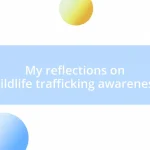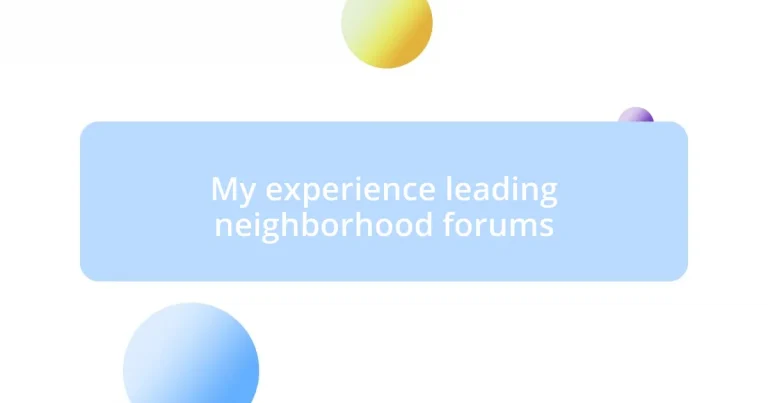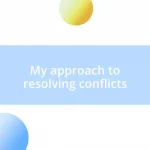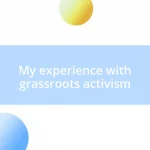Key takeaways:
- Neighborhood forums are essential for community engagement, fostering connection and empowering residents to collaborate on local issues.
- Effective leadership relies on building relationships, encouraging inclusivity, and being adaptable to the group’s dynamics.
- Creating a structured and interactive meeting environment enhances participation and feedback, leading to meaningful discussions.
- Addressing conflicts through open dialogue and establishing ground rules promotes respect and teamwork within the community.
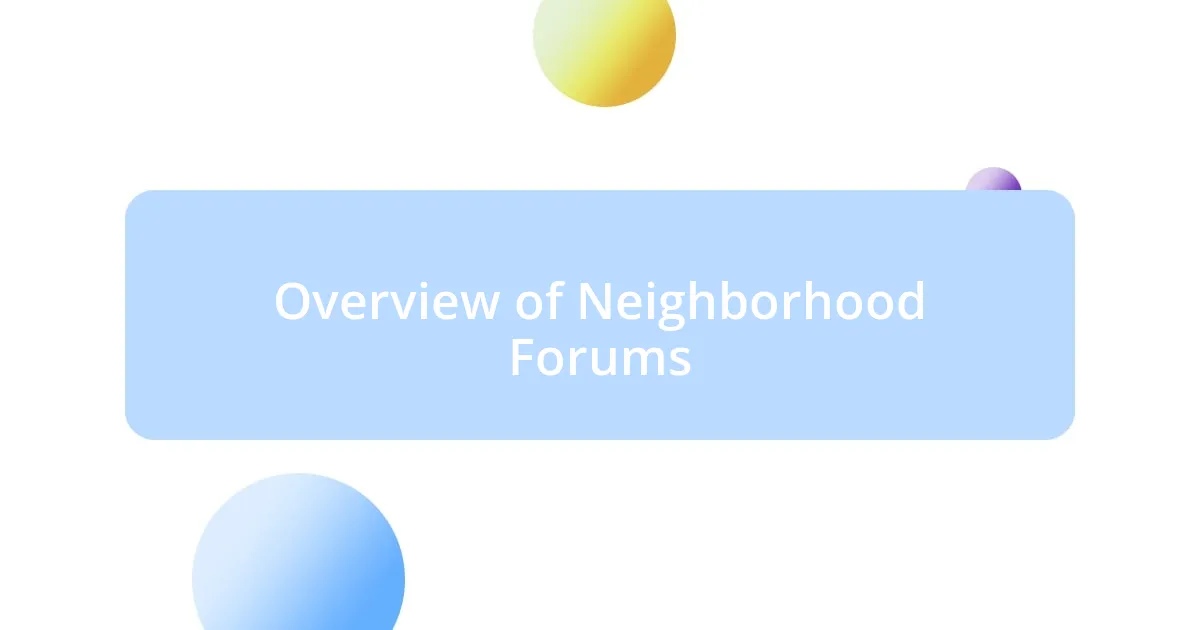
Overview of Neighborhood Forums
Neighborhood forums typically serve as community platforms where residents can voice their concerns, share ideas, and collaborate to improve their surroundings. I remember attending my first forum; the energy in the room was palpable, and it struck me just how eager people were to engage in discussions that matter. It felt like being part of a bigger family, all striving for a common goal—making our neighborhood better.
These gatherings can take various forms—some are casual meet-ups over coffee, while others are more structured with agendas and guest speakers. I found it fascinating how each type invites different levels of participation. Ever noticed how when someone shares a personal story about a local issue, the entire mood shifts? It’s a true reminder of the power of connection and how shared experiences can spark meaningful dialogue.
Moreover, neighborhood forums can be a bit like a garden. With care and attention, they flourish, but they can also wilt if neglected. I’ve often questioned why some forums thrive while others fade away. It usually comes down to active participation and a welcoming atmosphere. When people feel heard, they’re more likely to contribute, and that creates a cycle of engagement that truly transforms a community.
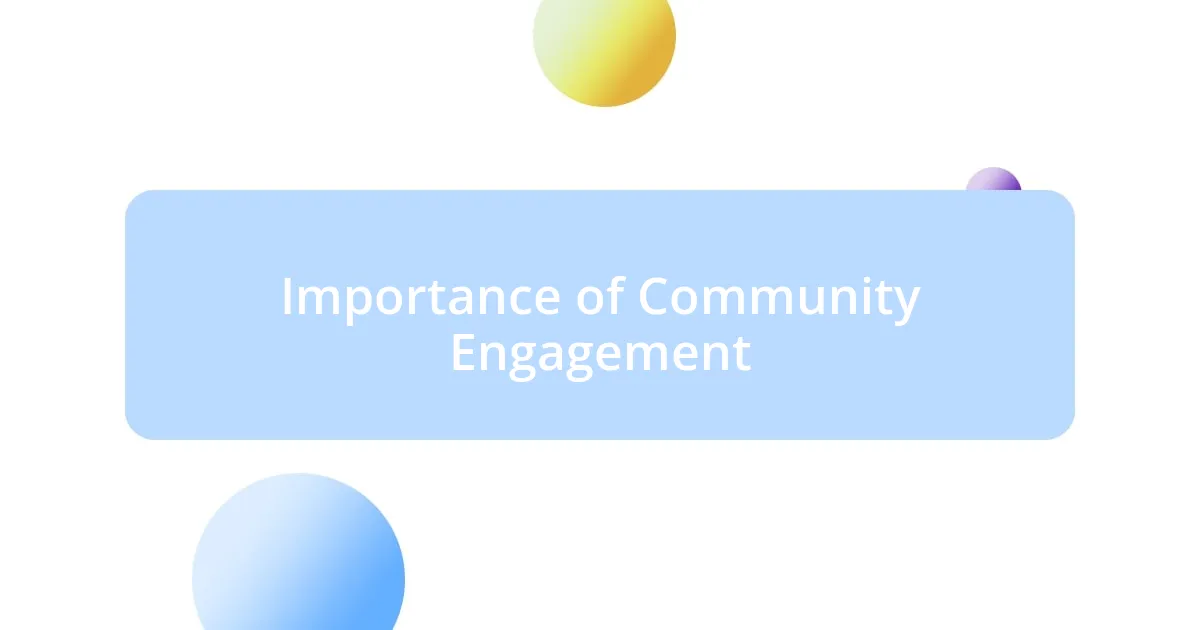
Importance of Community Engagement
Community engagement is essential because it fosters a sense of belonging. I remember a time when I facilitated a discussion about our local park’s future. Residents shared not just ideas but personal stories—like family picnics and childhood memories—everyone felt like their voice mattered. That connection turned a simple meeting into a collective vision for our community. When people actively participate, they become invested in the outcomes, nurturing a stronger, more resilient neighborhood.
- Enhanced communication fosters understanding and trust among residents.
- Diverse perspectives lead to more comprehensive solutions to local issues.
- Community engagement can empower individuals to take action and become leaders.
- It creates a foundation for collaboration, making it easier to tackle larger projects.
- A vibrant community network encourages social cohesion and mutual support.
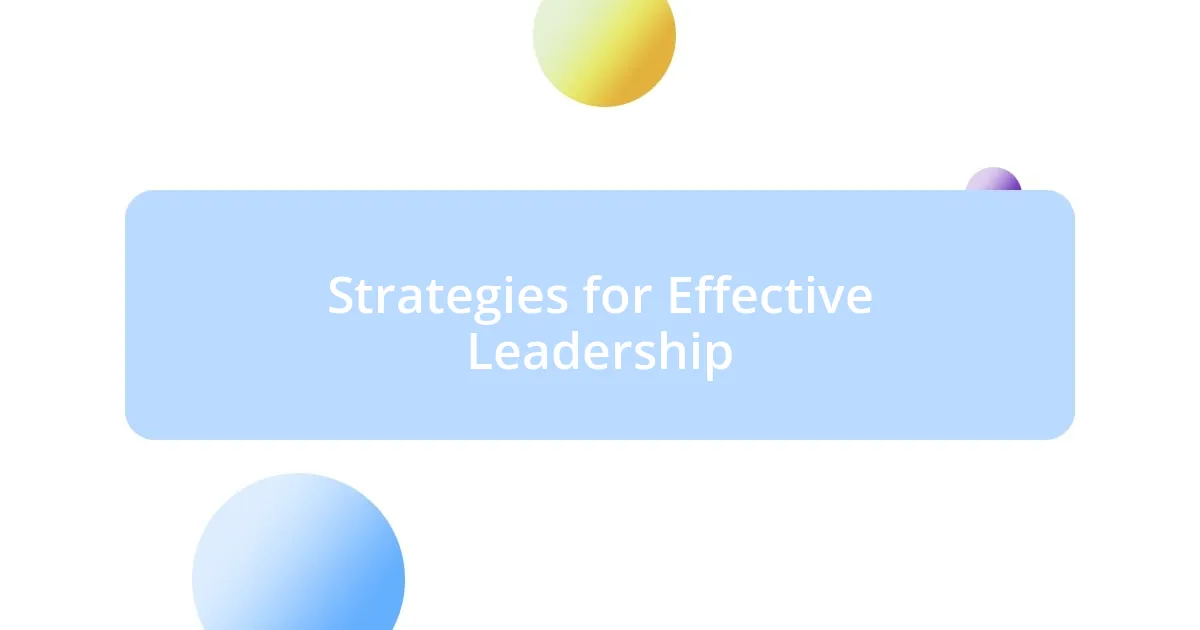
Strategies for Effective Leadership
Effective leadership in neighborhood forums often hinges on building strong relationships. I’ve discovered that taking time to know forum members personally can foster a sense of trust and connection. For instance, during one of my first meetings, I made it a point to introduce myself to everyone. A simple interaction here and there transformed strangers into neighbors with shared interests. This personal touch created an atmosphere where ideas flowed freely.
Another important strategy is to encourage inclusivity. I recall a time when a quiet member shared a groundbreaking idea that reshaped our community project. By actively inviting different voices to speak up, I realized we were tapping into a well of untapped wisdom. It marked a shift in our discussions, making them richer and more dynamic, as individuals felt their contributions were genuinely valued.
Lastly, adaptability plays a key role in effective leadership. I often found myself adjusting the agenda based on the group’s energy and interest. During one session, a heated debate about safety issues arose unexpectedly. Instead of sticking rigidly to the agenda, I allowed the conversation to unfold. It resulted in a passionate response from participants, sparking immediate actions and collaborations that we hadn’t planned but turned out to be incredibly impactful.
| Strategy | Description |
|---|---|
| Relationship Building | Fostering trust through personal connections with members. |
| Inclusivity | Encouraging diverse voices leads to richer discussions and innovative ideas. |
| Adaptability | Adjusting to the group’s dynamic ensures relevant and passionate discussions. |
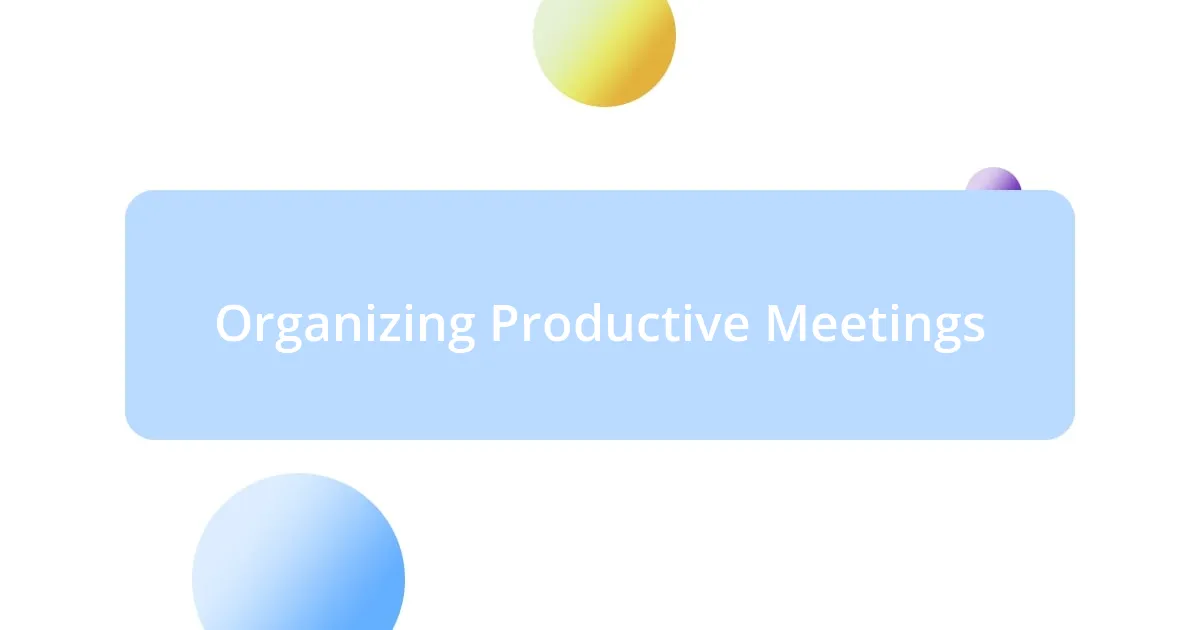
Organizing Productive Meetings
Organizing productive meetings often starts with a well-thought-out agenda. I’ve learned that distributing the agenda ahead of time gives participants a chance to prepare, which boosts engagement. It might sound basic, but I remember feeling the energy shift in a meeting when people came in with ideas they’d spent time thinking about. Doesn’t it feel better to have a group that’s prepped and ready to go?
Another crucial aspect is setting clear goals for each meeting. One time, I made the mistake of having a vague goal, which led to a meandering discussion that felt unproductive. Afterward, I decided on a specific objective for each session, which transformed our discussions from wandering dialogues into focused brainstorming. It’s incredible how clarity can sharpen the collective mind!
Lastly, incorporating interactive activities can breathe life into your meetings. I once used a “quick survey” method where participants wrote down their thoughts on sticky notes. We then grouped similar ideas together. The shift in atmosphere was palpable, and discussions flowed more naturally, creating a sense of ownership among everyone present. Have you ever tried a hands-on approach like this? It’s these small changes that can lead to more collaborative and fruitful discussions.
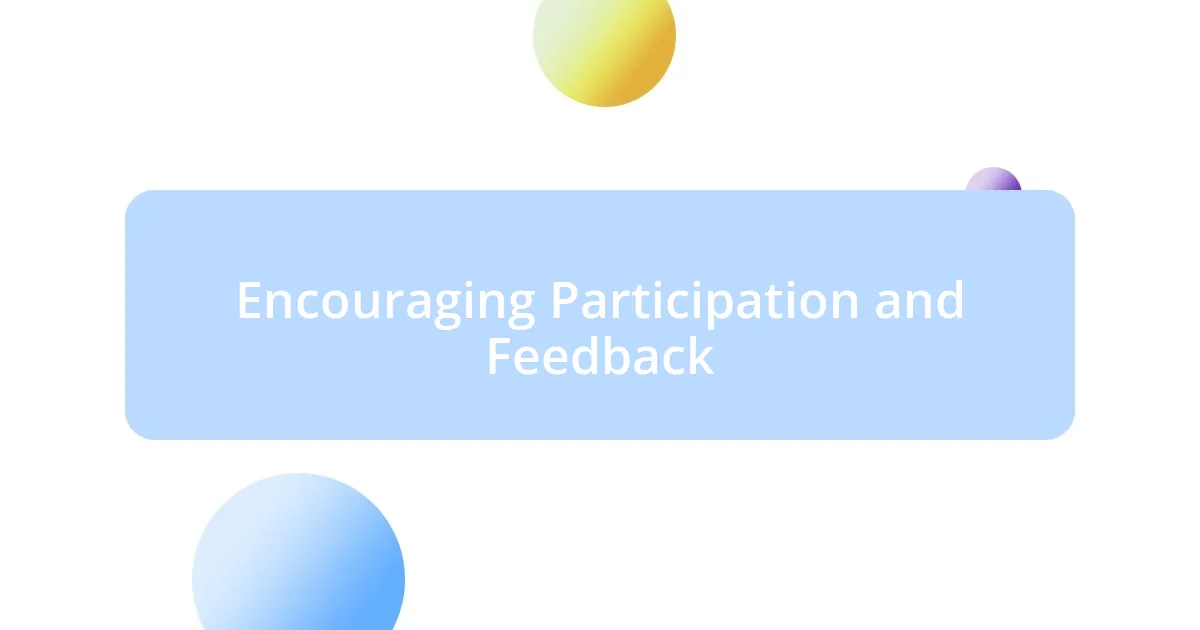
Encouraging Participation and Feedback
Encouraging participation and feedback is essential for a thriving neighborhood forum. I often remind participants that their voices matter. At one of our meetings, I started a session by asking everyone to share their biggest concerns or ideas. The room fell silent at first, but when the first brave soul spoke up, an unexpected wave of enthusiasm followed. It was as if a door had been opened, inspiring others to share as well. Have you noticed how one person’s courage can spark a collective discussion?
Creating a comfortable environment is also key. I remember introducing an anonymous feedback box at the end of each meeting. Initially, I was unsure if it would resonate. To my surprise, members began leaving thoughtful comments and suggestions. This simple act not only provided valuable insights but also made individuals feel safe to express their opinions without fear of judgment. Isn’t it fascinating how anonymity can sometimes encourage more honesty?
Finally, I like to use follow-up actions to show that feedback is valued. After implementing suggestions from a recent meeting, I sent out a brief update highlighting the changes made. The responses were heartwarming—many thanked me for listening and acted on their suggestions. It reinforced the idea that this is a collective endeavor. It’s rewarding to know that participation actively shapes our community. Have you ever felt more invested in something when you see your input having real outcomes? That’s the power of encouragement and feedback.
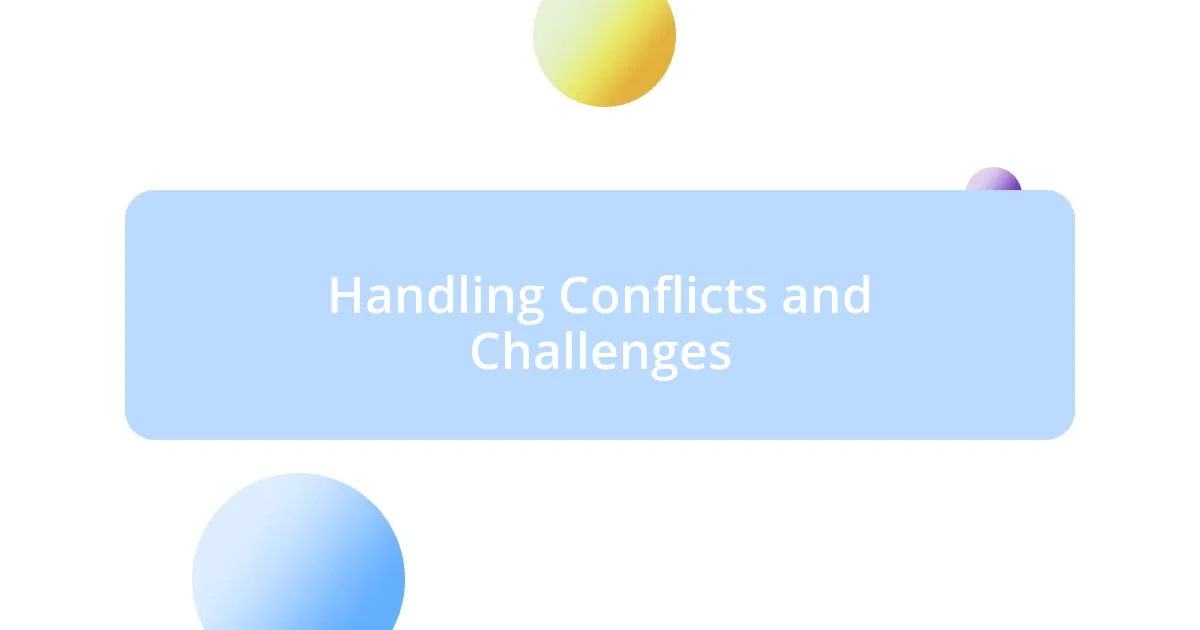
Handling Conflicts and Challenges
Handling conflicts in neighborhood forums is inevitable, but I’ve found that addressing them head-on can lead to stronger community bonds. During one particularly tense meeting, two members disputed the allocation of funds for a community project. Instead of shying away from the conflict, I encouraged both sides to present their perspectives. This open dialogue not only diffused the situation but allowed us to reach a compromise that satisfied everyone. Isn’t it amazing how talking things out can turn tension into teamwork?
Another challenge I faced was managing differing opinions on neighborhood development. I distinctly remember a session where passions ran high over plans for building a new park. Rather than letting the discussions spiral into chaos, I introduced a “pros and cons” chart on a whiteboard. Participants contributed their thoughts, and suddenly, we weren’t just opposing forces; we were a group striving for a common goal. How often do you find that visuals can bring clarity to confusion? It’s a simple tactic, but it can direct that raw energy toward productive solutions.
Moreover, I realized that sometimes, the hardest part is establishing ground rules for respectful dialogue. I once had to remind participants of our shared commitment to civility during a particularly fiery exchange. After sharing anecdotes from my own experiences—where respectful conversations led to breakthroughs—I noticed a palpable shift in the atmosphere. People seemed to reconsider their approaches. It reinforces the idea that maintaining respect, even when times get heated, can lead to unexpected breakthroughs. Don’t you agree that our communities deserve conversations that uplift rather than divide?
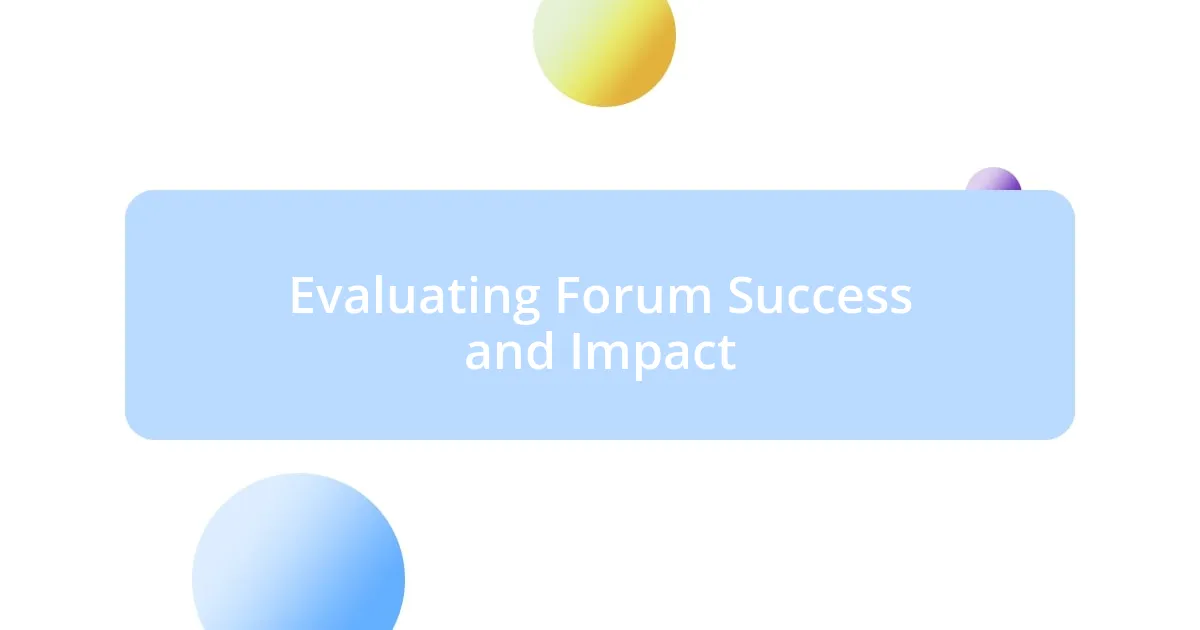
Evaluating Forum Success and Impact
Evaluating the success of our neighborhood forums often revolves around tangible outcomes and participant satisfaction. After each event, I’ve taken a moment to survey attendees about their experiences. Surprisingly, most respondents expressed feeling more connected to their neighbors and community goals, which really showcases the impact of these gatherings. Isn’t it remarkable how a simple questionnaire can reveal the heart of a forum’s success?
One of my most memorable measures of impact came after implementing regular feedback sessions, where I encouraged participants to voice their thoughts on the forums themselves. I remember one session where a participant shared how attending these meetings had revitalized their sense of belonging in our community. That kind of heartfelt insight is invaluable; it’s a sign that we’re on the right track, right? I cherish moments like these because they reinforce the notion that our efforts are making a real difference in people’s lives.
Beyond just casual feedback, I like to observe the tangible changes within our community. For instance, after addressing neighborhood safety concerns voiced in the forums, we organized a community watch group that led to a noticeable drop in local incidents. Witnessing this shift felt incredibly rewarding and illustrated how engaged dialogue can spark meaningful action. Have you ever felt that exhilarating rush when you see collective efforts bear fruit? It’s in these moments that I truly understand the profound impact that a supportive forum can have on a neighborhood.





